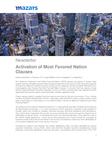
Activation of Most Favored Nation Clauses
The "National Treatment" and "Most Favored Nation" (MFN) clauses are typical of foreign trade treaties and are intended to prevent discriminatory treatment in the areas in which they were agreed. Through the National Treatment clause, foreign service suppliers cannot be treated differently from local suppliers and, through the Most Favored Nation clause, if a country that has signed a treaty grants a special benefit to another signatory country, all other countries that have signed the same agreement will have the right to have that better condition applied to them.
These clauses quickly migrated from the trade environment to the tax environment. Thus, Double Taxation Avoidance Agreements ("DTAs"), especially under the OECD model, contain clauses (in the body of the treaty or in its protocol) of "non-discrimination" (similar to National Treatment) and "Most Favored Nation".
According to Omar Cabrera (Revista de Derecho. U. Externado de Colombia "Análisis de la Claáusula de Nación Más Favorecida (...)"), in the first wave of DTAs signed by Colombia it was possible to include, within the concept of royalties, technical services, technical assistance and consultancy. Thus, at the time of payment, the country of source could tax this income through the mechanism of withholding at source, which - in the absence of such conventional stipulation, and under the rules of the OECD model agreement - could not be done because such income would be classified as business profits and could only be taxed in the country of residence unless they were attributable to a Permanent Establishment in the country of source.
According to Cabrera, this strategy was initially adopted by India, and later replicated by several countries (Colombia, among them), which saw that their taxation would be eroded when doing business of technical assistance, technical services or consultancy with countries with DTTs. The condition for the countries of residence to agree to treat this income as royalties was the inclusion of a Most Favored Nation clause.
In the second wave of DTAs signed by Colombia (with France, the United Kingdom and the United Arab Emirates) these services were not included within the definition of royalties, which is why they have to be treated as business benefits.
When the DTA with the United Kingdom came into force (in December 2019), the Most Favored Nation clauses were activated, making such treatment applicable -in theory- to the other agreements. The Directorate of National Taxes and Customs, by means of Concept 100202208- 0191 of February 17, 2020, interpreted the literal wording of such clauses in the DTAs that Colombia has in force and concluded that only in the case of Mexico, Czech Republic, Canada and Portugal, such clauses were activated, while in the case of Spain, Chile and Switzerland such phenomenon did not occur. Probably, the non-recognition of the activation of these clauses for those countries will end up in the initiation of the mutual agreement procedure (dispute resolution procedure) established in each BIT.
In view of the above, whoever intends to make payments for technical assistance, technical services or consulting services to countries with a DTT in force, will have to review whether or not these are considered as royalties to determine whether it is appropriate to withhold tax at source.


